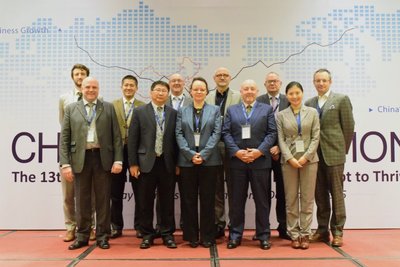SHANGHAI, Dec. 9, 2015 /PRNewswire/ -- On 3 December, after a tremendous Centenary year thus far, The British Chamber of Commerce Shanghai rounded off the business celebrations with a half-day conference on China's 13th Five Year Plan. As a leader in economic development, China's reform and its impact on different industries are of great concern to both domestic and foreign companies. This is further fuelled by the recent acceptance of the RMB by the International Monetary Fund (IMF) as one of the currencies included in the basket that make up the Special Drawing Right (SDR). Thus, the centenary event focused on the implications of the plan for businesses and how companies should adapt and take advantage of the changing business environment.
The conference featured ten key speakers and panelists, addressing a fully-packed room, which led to a fruitful morning of discussion and engagement. The event received an enthusiastic response from members in different industries and also served as a platform for professionals to keep track of current changes, specifically in China.
Three main areas of focus were explored, namely:
The regulatory landscape:
Government relations:
Consumer demands:
These highlight some of the key components in the 13th Plan, which has drawn great interest both at home and overseas.

Notes to the Editor:
About The British Chamber of Commerce Shanghai
In May of 1915, during the time of the Great War in Europe, a group of British merchants gathered at the British Consul's residence in Shanghai to discuss how to protect British business interests during a time of conflict. The meeting culminated in the formation of the British Chamber of Commerce Shanghai. Although, at that time, it was considered to be a short wartime initiative, this business support organisation quickly grew in size and activity beyond the end of the First World War. The following years would see the establishment of many more British Chambers in China and by 1925 the Association of British Chambers of Commerce in China and Hong Kong, headquartered in Shanghai, had a total membership of 23 British Chambers.
Today, the British Chamber of Commerce Shanghai comprises over 300 British companies and international companies with a British interest, ranging from the largest multinationals to small start-ups operating in East china. The Chamber is a non-for-profit, non-governmental organisation, funded and governed by its members. As one of the oldest foreign Chambers still operating in China, the Chamber's original ethos of helping each other in the interests of growing British trade with China, is as true today as it was 100 years ago.
Photo - http://photos.prnasia.com/prnh/20151209/0861512232-a
Photo - http://photos.prnasia.com/prnh/20151209/0861512232-b